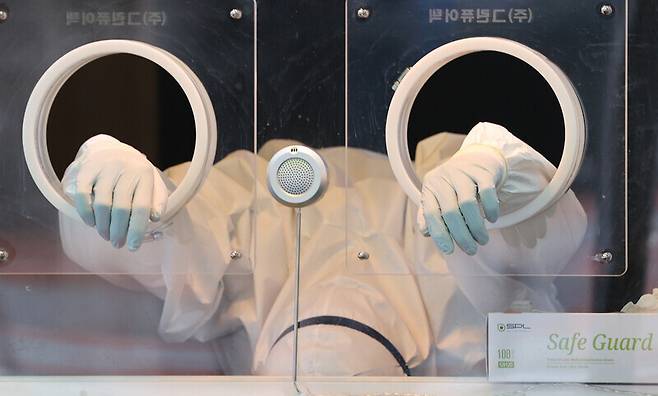S. Korea pushes to vaccinate all citizens for free
전체 맥락을 이해하기 위해서는 본문 보기를 권장합니다.
The South Korean government is planning to offer COVID-19 vaccines to all citizens free of charge. This broader approach comes after previous plans to inoculate 36 million people categorized as "priority recipients."
He also noted that a "[COVID-19] treatment developed by a domestic company is also under review for approval."
이 글자크기로 변경됩니다.
(예시) 가장 빠른 뉴스가 있고 다양한 정보, 쌍방향 소통이 숨쉬는 다음뉴스를 만나보세요. 다음뉴스는 국내외 주요이슈와 실시간 속보, 문화생활 및 다양한 분야의 뉴스를 입체적으로 전달하고 있습니다.

The South Korean government is planning to offer COVID-19 vaccines to all citizens free of charge. This broader approach comes after previous plans to inoculate 36 million people categorized as “priority recipients.”
The government is also weighing whether to classify healthy adults aged 50 to 64 without chronic conditions as priority recipients. The government has secured enough doses to inoculate 56 million people, but plans to obtain more.
“[COVID-19] vaccinations can start next month,” President Moon Jae-in said in a New Year’s address delivered on Jan. 11 at the Blue House.
“We will see to it that all citizens will be inoculated free of charge, starting with those prioritized,” he continued.
He also noted that a “[COVID-19] treatment developed by a domestic company is also under review for approval.”
“The entire process, from the safety test and authorization of the treatment to its application and effectiveness, will be disclosed in a transparent manner,” he pledged, adding that the “development of homegrown vaccines will continue to be encouraged.”
But in a regular briefing the same day, Korea Disease Control and Prevention Agency (KDCA) Director Jung Eun-kyeong predicted it would be “difficult to provide individuals with the option of choosing a vaccine.”
The government also announced that day that it may categorize healthy adults aged 50 to 64 as priority vaccine recipients. A provisional list of recommended priority recipients by the KDCA includes adults aged 50 to 64 along with healthcare workers; residents and workers at nursing homes and other group care facilities; senior citizens aged 65 and up; adults with chronic illnesses; workers in children’s education and childcare; COVID-19 primary response workers; police; firefighters; soldiers; and inmates and staff at correctional facilities and forensic psychiatric hospitals.
Explaining the scope of recommended priority recipient selection, Jung said, “We’re estimating somewhere in the neighborhood of 32 to 36 million people, and we’re currently establishing a concrete list and scale through local governments and related agencies and associations.”
Jung also sounded a cautious note on vaccinating younger people under 18 years of age.
“It’s still too early to talk about plans for vaccinating adolescents,” she said. The reasons for this include the low rates of severe COVID-19 symptoms and deaths among children and adolescents, and the fact that the vaccines’ safety in the age group has yet to be confirmed through clinical trials. The US Food and Drug Administration (FDA) has announced its conclusion that a vaccine developed by Pfizer can safely be administered to 16- and 17-year-olds.
By Kim Ji-eun and Lee Wan, staff reporters
Please direct comments or questions to [english@hani.co.kr]
Copyright © 한겨레. 무단전재 및 재배포 금지.
- 6살 숨지게 한 ‘낮술 운전’ 징역 8년…“구형보다 약한 처벌”
- 괌 침입종 뱀의 비결, 올가미로 전봇대 오르기
- 막오른 선거…안철수·나경원 ‘잰걸음’, 스텝 꼬인 오세훈
- “이루다 개발사, 연인 카톡 대화 수집하고는 돌려보며 웃었다”
- [영상] 그물에 갇혀 19일, 피 흘리며 죽어간 어린 밍크고래
- ‘미래에 대한 책임’ 첫 소송…정부 이긴 환경단체, 석유회사 조준
- “소행성 궤도를 바꿔라”…아마겟돈 실험이 시작된다
- 여의봉처럼 스마트폰-태블릿 변화무쌍…‘LG 롤러블’ 깜짝 공개
- ‘그날’도 아니고 ‘마법’도 아니고 ‘생리’입니다
- ‘연쇄 이동’ 여자배구 세터 ‘춘추전국시대’